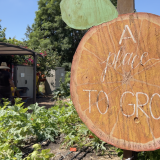September Research Highlights Schmidsters on the morning news
September 30, 2024
Elena Skender ‘25 and Sophia Wallace ‘24 are featured in a Spectrum News 1 story about a research study they carried out with classmates in their plant biology laboratory class this past spring. Working in collaboration with the Irvine Ranch Conservancy, the students studied the thermal limits of common native plant species in Southern California. The results of their work are reported in a preliminary preprint.
Watch the Spectrum News 1 spot here!
Nicole Schwartz, a postdoctoral research and teaching fellow in the Grand Challenges Initiative, has been interviewed for the Journal of Experimental Biology. Schwartz is studying hormones and behavior as they relate to early-life development in the lab of Patricia Lopes.
Niko Todorov, a Computational and Data Sciences Ph.D. student working in Hesham El-Askary‘s Earth System Science Data Solutions Lab, worked with FEMA for nearly a decade to model risk from natural disasters. Now, he and Professor Cyril Rakovski have won a grant from the National Artificial Intelligence Research Resource (NAIRR) Pilot program to use AI to build the next generation of models predicting hurricane formation. The NAIRR Pilot aims to connect U.S. researchers and educators to computational, data, and training resources needed to advance AI research and research that employs AI.
Yakir Aharanov — co-director of the Institute for Quantum Studies, professor of theoretical physics, and the James J. Farley Professor of Natural Philosophy — has published a new article entitled “Angular momentum flow without anything carrying it” in the journal Physical Review A. The research has attracted the attention of Scientific American, with an article entitled “A New Quantum Cheshire Cat Thought Experiment Is Out of the Box.”
Andrew Jordan, the Kennedy Chair in Physics and co-director of the Institute for Quantum Studies, has received a $2.43 million grant from the John Templeton Foundation to create a “Southern California Quantum Foundations Hub” at Chapman University. Jordan is joined by professors Matt Leifer, Emily Adlam and Kelvin McQueen, as well as researchers from University of Toronto and UC San Diego.
Emily Adlam, assistant professor of philosophy and physics, has published a new study entitled “Quantum field theory and the limits of reductionism” in the journal Synthese. In the article, Adlam argues that our current understanding of quantum field theory (QFT) provides some reason to question the common consensus “that the most fundamental things in nature appear at the smallest scales, so everything happening at large distance scales supervenes on whatever is happening at smaller distance scales.”


